- Home
- Herman Melville
Billy Budd, Bartleby, and Other Stories Page 8
Billy Budd, Bartleby, and Other Stories Read online
Page 8
How to get to fairy-land, by what road, I did not know; nor could any one inform me; not even one Edmund Spenser, who had been there-so he wrote me-further than that to reach fairy-land, it must be voyaged to, and with faith. I took the fairy-mountain’s bearings, and the first fine day, when strength permitted, got into my yawl-high-pommeled, leather one-cast off the fast, and away I sailed, free voyager as an autumn leaf. Early dawn; and, sallying westward, I sowed the morning before me.
Some miles brought me nigh the hills; but out of present sight of them. I was not lost; for road-side golden-rods, as guide-posts, pointed, I doubted not, the way to the golden window. Following them, I came to a lone and languid region, where the grass-grown ways were traveled but by drowsy cattle, that, less waked than stirred by day, seemed to walk in sleep. Browse, they did not-the enchanted never eat. At least, so says Don Quixote, that sagest sage that ever lived.
On I went, and gained at last the fairy-mountain’s base, but saw yet no fairy ring. A pasture rose before me. Letting down five mouldering bars-so moistly green, they seemed fished up from some sunken wreck-a wigged old Aries, long-visaged, and with crumpled horn, came snuffing up; and then, retreating, decorously led on along a milky-way of white-weed, past dim-clustering Pleiades and Hyades, of small forget-me-nots; and would have led me further still his astral path, but for golden flights of yellow-birds-pilots, surely, to the golden window, to one side flying before me, from bush to bush, towards deep woods-which woods themselves were luring-and, somehow, lured, too, by their fence, banning a dark road, which, however dark, led up. I pushed through; when Aries, renouncing me now for some lost soul, wheeled, and went his wiser way. Forbidding and forbidden ground-to him.
A winter wood road, matted all along with wintergreen. By the side of pebbly waters-waters the cheerier for their solitude; beneath swaying fir-boughs, petted by no season, but still green in all, on I journeyed-my horse and I; on, by an old saw-mill, bound down and hushed with vines, that his grating voice no more was heard; on, by a deep flume clove through snowy marble, vernal-tinted, where freshet eddies had, on each side, spun out empty chapels in the living rock; on, where Jacks-in-the-pulpit, like their Baptist namesake, preached but to the wilderness; on, where a huge, cross-grain block, fern-bedded, showed where, in forgotten times, man after man had tried to split it, but lost his wedges for his pains-which wedges yet rusted in their holes; on, where, ages past, in step-like ledges of a cascade, skull-hollow pots had been churned out by ceaseless whirling of a flintstone-ever wearing, but itself unworn; on, by wild rapids pouring into a secret pool, but soothed by circling there awhile, issued forth serenely; on, to less broken ground, and by a little ring, where, truly, fairies must have danced, or else some wheel-tire been heated-for all was bare; still on, and up, and out into a hanging orchard, where maidenly looked down upon me a crescent moon, from morning.
My horse hitched low his head. Red apples rolled before him; Eve’s apples; seek-no-furthers. He tasted one, I another; it tasted of the ground. Fairy-land not yet, thought I, flinging my bridle to a humped old tree, that crooked out an arm to catch it. For the way now lay where path was none, and none might go but by himself, and only go by daring. Through blackberry brakes that tried to pluck me back, though I but strained towards fruitless growths of mountain-laurel; up slippery steeps to barren heights, where stood none to welcome. Fairy-land not yet, thought I, though the morning is here before me.
Foot-sore enough and weary, I gained not then my journey’s end, but came ere long to a craggy pass, dipping towards growing regions still beyond. A zigzag road, half overgrown with blueberry bushes, here turned among the cliffs. A rent was in their ragged sides; through it a little track branched off, which, upwards threading that short defile, came breezily out above, to where the mountain-top, part sheltered northward, by a taller brother, sloped gently off a space, ere darkly plunging; and here, among fantastic rocks, reposing in a herd, the foot-track wound, half beaten, up to a little, low-storied, grayish cottage, capped, nun-like, with a peaked roof.
On one slope, the roof was deeply weather-stained, and, nigh the turfy eaves-trough, all velvet-napped; no doubt the snail-monks founded mossy priories there. The other slope was newly shingled. On the north side, door-less and windowless, the clapboards, innocent of paint, were yet green as the north side of lichened pines, or copperless hulls of Japanese junks, becalmed. The whole base, like those of the neighboring rocks, was rimmed about with shaded streaks of richest sod; for, with hearth-stones in fairy-land, the natural rock, though housed, preserves to the last, just as in open fields, its fertilizing charm; only, by necessity, working now at a remove, to the sward without. So, at least, says Oberon, grave authority in fairy lore. Though setting Oberon aside, certain it is, that, even in the common world, the soil, close up to farm-houses, as close up to pasture rocks, is, even though untended, ever richer than it is a few rods off-such gentle, nurturing heat is radiated there.
But with this cottage, the shaded streaks were richest in its front and about its entrance, where the ground-sill, and especially the door-sill had, through long eld, quietly settled down.
No fence was seen, no inclosure. Near by-ferns, ferns, ferns; further-woods, woods, woods; beyond-mountains, mountains, mountains; then-sky, sky, sky. Turned out in aerial commons, pasture for the mountain moon. Nature, and but nature, house and all; even a low cross-pile of silver birch, piled openly, to season; up among whose silvery sticks, as through the fencing of some sequestered grave, sprang vagrant raspberry bushes-willful assertors of their right of way.
The foot-track, so dainty narrow, just like a sheep-track, led through long ferns that lodged. Fairy-land at last, thought I; Una and her lamb dwell here. Truly, a small abode-mere palanquin, set down on the summit, in a pass between two worlds, participant of neither.
A sultry hour, and I wore a light hat, of yellow sinnet, with white duck trowsers-both relics of my tropic seagoing. Clogged in the muffling ferns, I softly stumbled, staining the knees a sea-green.
Pausing at the threshold, or rather where threshold once had been, I saw, through the open door-way, a lonely girl, sewing at a lonely window. A pale-cheeked girl, and fly-specked window, with wasps about the mended upper panes. I spoke. She shyly started, like some Tahiti girl, secreted for a sacrifice, first catching sight, through palms, of Captain Cook. Recovering, she bade me enter; with her apron brushed off a stool; then silently resumed her own. With thanks I took the stool; but now, for a space, I, too, was mute. This, then, is the fairy-mountain house, and here, the fairy queen sitting at her fairy window.
I went up to it. Downwards, directed by the tunneled pass, as through a leveled telescope, I caught sight of a far-off, soft, azure world. I hardly knew it, though I came from it.
‘You must find this view very pleasant,’ said I, at last.
‘Oh, sir,’ tears starting in her eyes, ‘the first time I looked out of this window, I said “never, never shall I weary of this.” ’
‘And what wearies you of it now?’
‘I don’t know,’ while a tear fell; ‘but it is not the view, it is Marianna.’
Some months back, her brother, only seventeen, had come hither, a long way from the other side, to cut wood and burn coal, and she, elder sister, had accompanied him. Long had they been orphans, and now, sole inhabitants of the sole house upon the mountain. No guest came, no traveler passed. The zigzag, perilous road was only used at seasons by the coal wagons. The brother was absent the entire day, sometimes the entire night. When at evening, fagged out, he did come home, he soon left his bench, poor fellow, for his bed; just as one, at last, wearily quits that, too, for still deeper rest. The bench, the bed, the grave.
Silent I stood by the fairy window, while these things were being told.
‘Do you know,’ said she at last, as stealing from her story, ‘do you know who lives yonder?-I have never been down into that country-away off there, I mean; that house, that marble one,’ pointing far across the lo
wer landscape; ‘have you not caught it? there, on the long hill-side: the field before, the woods behind; the white shines out against their blue; don’t you mark it? the only house in sight.’
I looked; and after a time, to my surprise, recognized, more by its position than its aspect, or Marianna’s description, my own abode, glimmering much like this mountain one from the piazza. The mirage haze made it appear less a farm-house than King Charming’s palace.
‘I have often wondered who lives there; but it must be some happy one; again this morning was I thinking so.’
‘Some happy one,’ returned I, starting; ‘and why do you think that? You judge some rich one lives there?’
‘Rich or not, I never thought; but it looks so happy, I can’t tell how; and it is so far away. Sometimes I think I do but dream it is there. You should see it in a sunset.’
‘No doubt the sunset gilds it finely; but not more than the sunrise does this house, perhaps.’
‘This house? The sun is a good sun, but it never gilds this house. Why should it? The old house is rotting. That makes it so mossy. In the morning, the sun comes in at this old window, to be sure-boarded up, when first we came; a window I can’t keep clean, do what I may-and half burns, and nearly blinds me at my sewing, besides setting the flies and wasps astir-such flies and wasps as only lone mountain houses know. See, here is the curtain-this apron-I try to shut it out with them. It fades it, you see. Sun gild this house? not that ever Marianna saw.’
‘Because when this roof is gilded most, then you stay here within.’
‘The hottest, weariest hour of day, you mean? Sir, the sun gilds not this roof. It leaked so, brother newly shingled all one side. Did you not see it? The north side, where the sun strikes most on what the rain has wetted. The sun is a good sun; but this roof, it first scorches, and then rots. An old house. They went West, and are long dead, they say, who built it. A mountain house. In winter no fox could den in it. That chimney-place has been blocked up with snow, just like a hollow stump.’
‘Yours are strange fancies, Marianna.’
‘They but reflect the things.’
Then I should have said, “These are strange things,” rather than, “Yours are strange fancies.”’
‘As you will’; and took up her sewing.
Something in those quiet words, or in that quiet act, it made me mute again; while, noting, through the fairy window, a broad shadow stealing on, as cast by some gigantic condor, floating at brooding poise on outstretched wings, I marked how, by its deeper and inclusive dusk, it wiped away into itself all lesser shades of rock or fern.
‘You watch the cloud,’ said Marianna.
‘No, a shadow; a cloud’s, no doubt-though that I cannot see. How did you know it? Your eyes are on your work.’
‘It dusked my work. There, now the cloud is gone, Tray comes back.’
‘How?’
‘The dog, the shaggy dog. At noon, he steals off, of himself, to change his shape-returns, and lies down awhile, nigh the door. Don’t you see him? His head is turned round at you; though, when you came, he looked before him.’
‘Your eyes rest but on your work; what do you speak of?’
‘By the window, crossing.’
‘You mean this shaggy shadow-the nigh one? And yes, now that I mark it, it is not unlike a large, black Newfoundland dog. The invading shadow gone, the invaded one returns. But I do not see what casts it.’
‘For that, you must go without.’
‘One of those grassy rocks, no doubt.’
‘You see his head, his face?’
‘The shadow’s? You speak as if you saw it, and all the time your eyes are on your work.’
‘Tray looks at you,’ still without glancing up; ‘this is his hour; I see him.’
‘Have you, then, so long sat at this mountain-window where but clouds and vapors pass, that, to you, shadows are as things, though you speak of them as of phantoms; that by familiar knowledge, working like a second sight, you can, without looking for them, tell just where they are though, as having mice-like feet, they creep about, and come and go; that, to you, these lifeless shadows are as living friends, who, though out of sight, are not out of mind, even in their faces-is it so?’
‘That way I never thought of it. But the friendliest one, that used to soothe my weariness so much, coolly quivering on the ferns, it was taken from me, never to return, as Tray did just now. The shadow of a birch. The tree was struck by lightning, and brother cut it up. You saw the cross-pile outdoors-the buried root lies under it; but not the shadow. That is flown, and never will come back, nor ever anywhere stir again.’
Another cloud here stole along, once more blotting out the dog, and blackening all the mountain; while the stillness was so still, deafness might have forgot itself, or else believed that noiseless shadow spoke.
‘Birds, Marianna, singing-birds, I hear none; I hear nothing. Boys and bob-o-links, do they never come a-berrying up here?’
‘Birds, I seldom hear; boys, never. The berries mostly ripe and fall-few, but me, the wiser.’
‘But yellow-birds showed me the way-part way, at least.’
‘And then flew back. I guess they play about the mountainside, but don’t make the top their home. And no doubt you think that, living so lonesome here, knowing nothing, hearing nothing-little, at least, but sound of thunder and the fall of trees-never reading, seldom speaking, yet ever wakeful, this is what gives me my strange thoughts-for so you call them-this weariness and wakefulness together. Brother, who stands and works in open air, would I could rest like him; but mine is mostly but dull woman’s work-sitting, sitting, restless sitting.’
‘But, do you not go walk at times? These woods are wide.’
‘And lonesome; lonesome, because so wide. Sometimes, ’tis true, of afternoons, I go a little way, but soon come back again. Better feel lone by hearth, than rock. The shadows hereabouts I know-those in the woods are strangers.’
‘But the night?’
‘Just like the day. Thinking, thinking-a wheel I cannot stop; pure want of sleep it is that turns it.’
‘I have heard that, for this wakeful weariness, to say one’s prayers, and then lay one’s head upon a fresh hop pillow-’
‘Look!’
Through the fairy window, she pointed down the steep to a small garden patch near by—mere pot of rifled loam, half rounded in by sheltering rocks, where side by side, some feet apart, nipped and puny, two hop vines climbed two poles, and, gaining their tip ends would have them joined over in upward clasp, but the baffled shoots, groping awhile in empty air, trained back whence they sprung.
‘You have tried the pillow, then?’
‘Yes.’
‘And prayer?’
‘Prayer and pillow.’
‘Is there no other cure, or charm?’
‘Oh, if I could but once get to yonder house, and but look upon whoever the happy being is that lives there! A foolish thought: why do I think it? Is it that I live so lonesome, and know nothing?’
‘I, too, know nothing; and, therefore, cannot answer; but, for your sake, Marianna, well could wish that I were that happy one of the happy house you dream you see; for then you would behold him now, and, as you say, this weariness might leave you.’
-Enough. Launching my yawl no more for fairy-land, I stick to the piazza. It is my box-royal; and this amphitheatre, my theatre of San Carlo. Yes, the scenery is magical-the illusion so complete. And Madam Meadow Lark, my prima donna, plays her grand engagement here; and, drinking in her sunrise note, which, Memnon-like, seems struck from the golden window, how far from me the weary face behind it.
But, every night, when the curtain falls, truth comes in with darkness. No light shows from the mountains. To and fro I walk the piazza deck, haunted by Marianna’s face, and many as real a story.
The Encantadas or Enchanted Isles
SKETCH FIRST
THE ISLES AT LARGE
—‘That may not be, said tben the Ferryman<
br />
Least we unweeting hap to be fordonne:
For those same Islands, seeming now and then,
Are not firme lande, nor any certein wonne,
But straggling plots, which to and fro do ronne
In the wide waters: therefore are they hight
The wandring Islands. Therefore doe them sbonne;
For they have oft drawne many a wandring wight
Into most deadly daunger and distressed plight;
For whosoever once bath fastened
His foot thereon, may never it recure,
But wandreth ever more uncertain and unsure. ’
‘Darke, dolefull, drearie, like a greedie grave,
That still for carrion carcases doth crave:
On top whereof aye dwelt the ghastly Owle,
Shrieking his balefull note, which ever drave
Farre from that haunt all other chearefull fowle;
And all about it wandring ghostes did waile and bowle.’
Take five-and-twenty heaps of cinders dumped here and there in an outside city lot; imagine some of them magnified into mountains, and the vacant lot the sea; and you will have a fit idea of the general aspect of the Encantadas, or Enchanted Isles. A group rather of extinct volcanoes than of isles; looking much as the world at large might, after a penal conflagration.
It is to be doubted whether any spot of earth can, in desolateness, furnish a parallel to this group. Abandoned cemeteries of long ago, old cities by piecemeal tumbling to their ruin, these are melancholy enough; but, like all else which has but once been associated with humanity, they still awaken in us some thoughts of sympathy, however sad. Hence, even the Dead Sea, along with whatever other emotions it may at times inspire, does not fail to touch in the pilgrim some of his less unpleasurable feelings.
And as for solitariness; the great forests of the north, the expanses of unnavigated waters, the Greenland ice-fields, are the profoundest of solitudes to a human observer ; still the magic of their changeable tides and seasons mitigates their terror; because, though unvisited by men, those forests are visited by the May; the remotest seas reflect familiar stars even as Lake Erie does; and, in the clear air of a fine Polar day, the irradiated, azure ice shows beautifully as malachite.

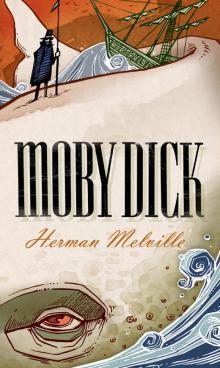 Moby Dick; Or, The Whale
Moby Dick; Or, The Whale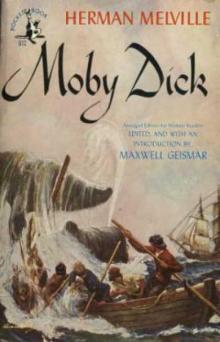 Moby Dick
Moby Dick Benito Cereno and Bartleby the Scrivener
Benito Cereno and Bartleby the Scrivener Israel Potter: His Fifty Years of Exile (Annotated Edition)
Israel Potter: His Fifty Years of Exile (Annotated Edition) Billy Budd and the Piazza Tales
Billy Budd and the Piazza Tales Billy Budd, Bartleby, and Other Stories
Billy Budd, Bartleby, and Other Stories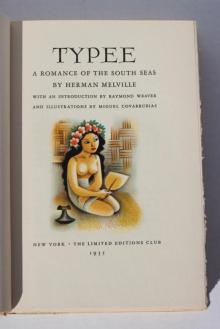 Typee: A Romance of the South Seas
Typee: A Romance of the South Seas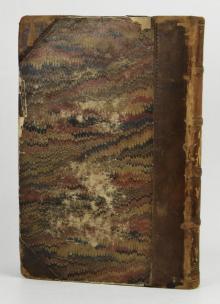 Omoo: Adventures in the South Seas
Omoo: Adventures in the South Seas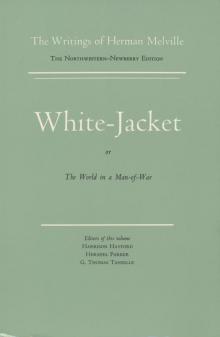 White Jacket; Or, The World on a Man-of-War
White Jacket; Or, The World on a Man-of-War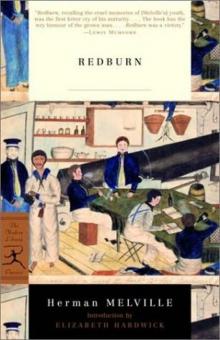 Redburn. His First Voyage
Redburn. His First Voyage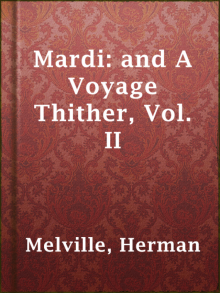 Mardi: and A Voyage Thither, Vol. II
Mardi: and A Voyage Thither, Vol. II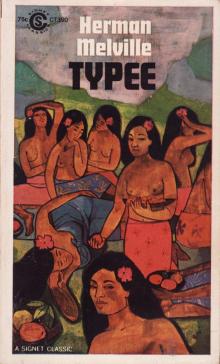 Typee
Typee The Paradise of Bachelors and the Tartarus of Maids
The Paradise of Bachelors and the Tartarus of Maids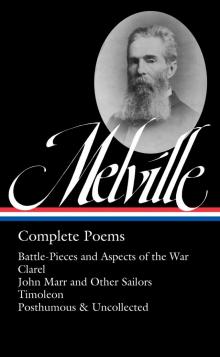 Herman Melville- Complete Poems
Herman Melville- Complete Poems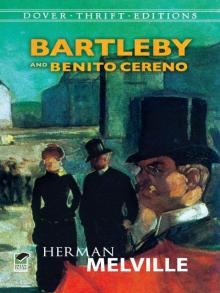 Bartleby and Benito Cereno
Bartleby and Benito Cereno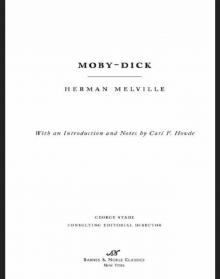 Moby-Dick (Barnes & Noble Classics Series)
Moby-Dick (Barnes & Noble Classics Series)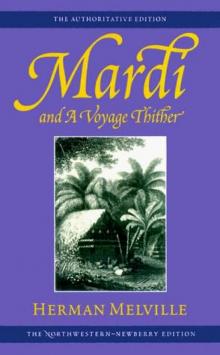 Mardi and a Voyage Thither
Mardi and a Voyage Thither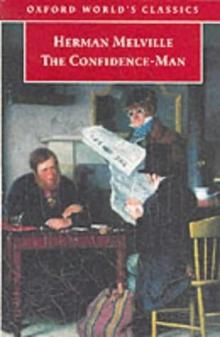 The Confidence-Man
The Confidence-Man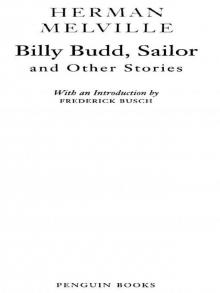 Billy Budd and Other Stories
Billy Budd and Other Stories Bartleby the Scrivener
Bartleby the Scrivener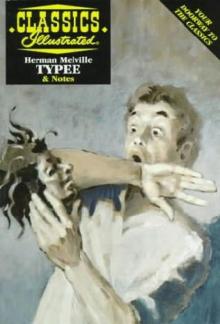 Typee: A Romance of the South Sea
Typee: A Romance of the South Sea I and My Chimney
I and My Chimney Billy Budd
Billy Budd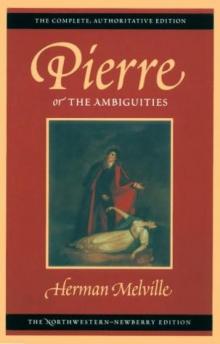 Pierre, Or the Ambiguities
Pierre, Or the Ambiguities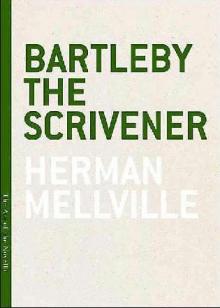 Bartleby, The Scrivener A Story of Wall-Street
Bartleby, The Scrivener A Story of Wall-Street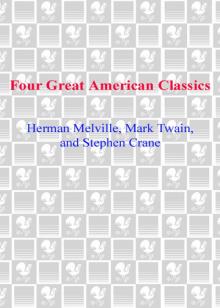 Four Great American Classics
Four Great American Classics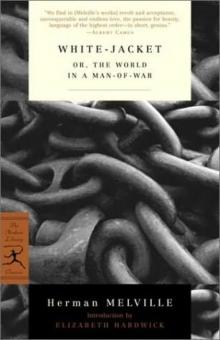 White Jacket or, The World on a Man-of-War
White Jacket or, The World on a Man-of-War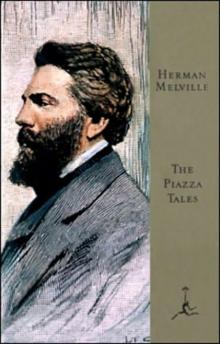 The Piazza Tales
The Piazza Tales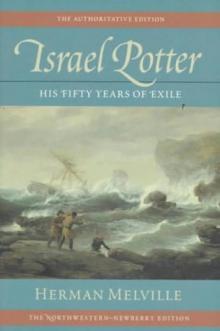 Israel Potter. Fifty Years of Exile
Israel Potter. Fifty Years of Exile